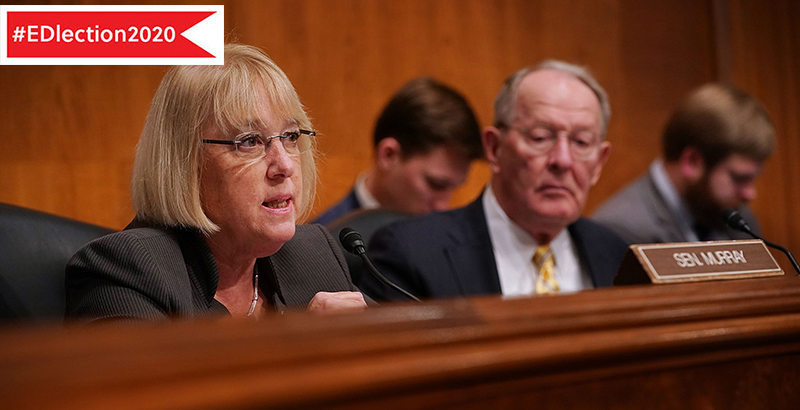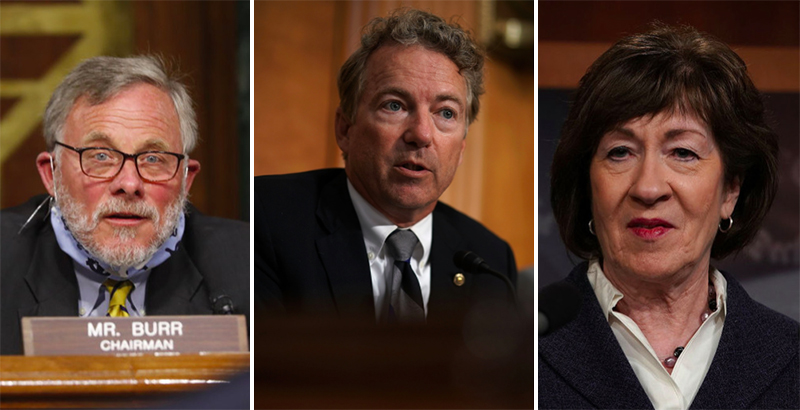Election to Bring Major Changes to Senate Education Committee, with Early Childhood Champion Patty Murray Likely to Lead if Democrats Prevail

With several close races offering Democrats the chance to take control of the Senate and Sen. Lamar Alexander’s upcoming retirement after five years as chair of the education committee, it’s clear federal education policy will take a turn next year. The question is where.
If Democrats assume the majority, it’s likely current Ranking Member Sen. Patty Murray of Washington would take over as chair of the Health, Education, Labor and Pensions Committee. The former preschool teacher has served for over 20 years on the committee, working, for example, on the Head Start reauthorization of 2007 and this year, sponsoring a $50 billion plan to stabilize the child care industry during the pandemic.
“From an [early-childhood education] perspective, you can’t get better than Sen. Murray,” said Sarah Rittling, executive director of the First Five Years Fund, who worked with both Alexander and Murray on the committee. “The longevity that she’s had transcends to staff, which is always really important.”
Murray’s experience would be valuable if the committee tackles any of the major education laws due for reauthorization — Head Start (overdue since 2012), the Every Student Succeeds Act (expiring next year), the Individuals with Disabilities Education Act (last amended in 2015), or the Higher Education Act (now 12 years overdue). Even though Alexander won’t see his long sought-after reauthorization of the higher education law before retiring in January, the committee has been known for getting work done in a bipartisan way — a reputation that education experts hope will continue.
Several tight Republican races
Other scenarios that could see someone else in the chair’s position. Even if the Democrats gain control of the Senate, Murray is also a high-ranking member on the appropriations committee, a spot that could open up if current Vice Chairman Patrick Leahy of Vermont assumes leadership of the judiciary committee. Next in line on the HELP Committee would be Bernie Sanders of Vermont, who voted against No Child Left Behind because of its emphasis on testing, and in his run for president, campaigned against charter schools and in favor of free child care, pre-K and college.

If the Republicans retain control, Alexander’s replacement becomes more of a wild card. North Carolina Sen. Richard Burr, with seniority on the committee, is next in line as chair, but his selection could be blocked by the outcome of an investigation into a stock sale he made in February.
Burr is under scrutiny for possible violation of the Stop Trading on Congressional Knowledge Act, meant to prevent insider trading among members of Congress. In May, Burr stepped down as chair of the Senate Intelligence Committee, but has said he plans to finish his term, which ends in 2022.
In the past, Burr has advocated for rolling the 21st Century Community Learning Centers program for afterschool services into a block grant, but has voted against using public funds to support private school tuition.
Next in the line of succession is Rand Paul of Kentucky, an advocate for dissolving the Department of Education.
Paul, who heads the Subcommittee on Children and Families, advocates for federal education funds to bypass states and go straight to families. Of the department, he once said, “I would cut them out of the loop. I don’t think you’d notice if the whole department were gone tomorrow.”
This year, he has repeatedly challenged Dr. Anthony Fauci, the White House’s top COVID-19 expert, on whether It’s safe for students to return to school.
Paul argued in July that because children are less likely to get and spread the virus, schools should be open.
Following Paul would be Susan Collins of Maine. The latest FiveThirtyEight poll, however, shows her falling further behind Democratic challenger Sara Gideon — 40 to 47 percent.
Even if Republicans maintain control, priorities could change if Collins loses her seat after five years on the committee.
Historically, Collins “hasn’t been someone who has overarchingly blocked progressive bills,” said Khalilah Harris, the managing director for K-12 education policy at the left-leaning Center for American Progress. She added, “Anytime you remove someone from the mix who has been working on major legislation, like the Elementary and Secondary Education Act, that changes the dynamic.”
Next in terms of seniority on the GOP side is Bill Cassidy of Louisiana, who has served on the committee since 2015. He is also running this year, but is considered a clear favorite for reelection.
With Republicans from several more states, including Georgia, Iowa, North Carolina, and South Carolina, in toss-up races, the latest FiveThirtyEight prediction gives Democrats an 80 percent chance of capturing a majority. Another model boosts those chances even higher to almost 85 percent.
The only Democrat on the HELP Committee in danger of defeat is Doug Jones of Alabama, who is running behind challenger Tommy Tuberville, a former Auburn University football coach. Elsewhere in the Senate, the only other Democrat currently in a tight race is Michigan’s Gary Peters, who holds a slight lead over businessman John James.
‘Epitome of collaboration’
If Democratic presidential nominee Joe Biden — who has a broad early education plan — is elected president, Murray could play a key role in elevating child care and universal pre-K as an early White House priority. But even if Trump stays on for another four years, there’s recognition on both sides of the aisle that child care is necessary for economic recovery, Rittling said.
“It wasn’t really until the pandemic that we saw how essential [child care] is to all families,” she said. “That public awareness has been done for us.”
Michael Petrilli, president of the conservative Thomas B. Fordham Institute, said that if Murray becomes chair, “it’s not hard to picture what that’s going to look like,” predicting she would try to “straddle” the demands of the teachers unions with those of reform groups.
While Petrilli said he doesn’t think there’s “a lot of appetite” among Republicans to take on major education legislation in the new year, Rittling, with the First Five Years Fund, added that “this is a committee that has historically figured things out,” regardless of the party in charge.
Alexander and Murray have set an example of bipartisanship, added Noelle Ellerson Ng, the associate executive director for policy and advocacy at AASA, The School Superintendents Association.
In their effort to replace the No Child Left Behind Act, for example, they agreed on a draft before introducing a bill so it wouldn’t be viewed as just a Republican or Democratic proposal. And last year, they collaborated on the FUTURE Act, which provides annual funding for historically Black colleges and universities and minority-serving institutions. It also eliminated some questions from the federal financial aid application — one of Alexander’s long-time goals.
“They are the epitome of what collaboration is. They have respect for each other, for their office for the committee, and for the process,” Ng said. “I would like to believe wholeheartedly that their strong commitment carries on to the next HELP Committee.”
Get stories like these delivered straight to your inbox. Sign up for The 74 Newsletter

;)
